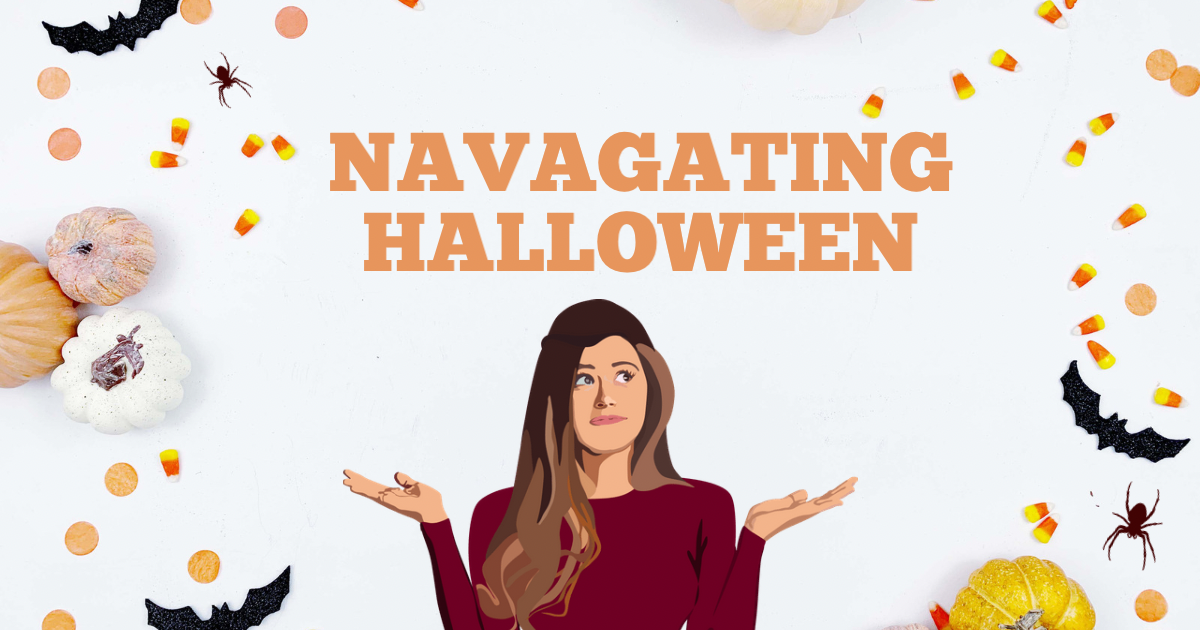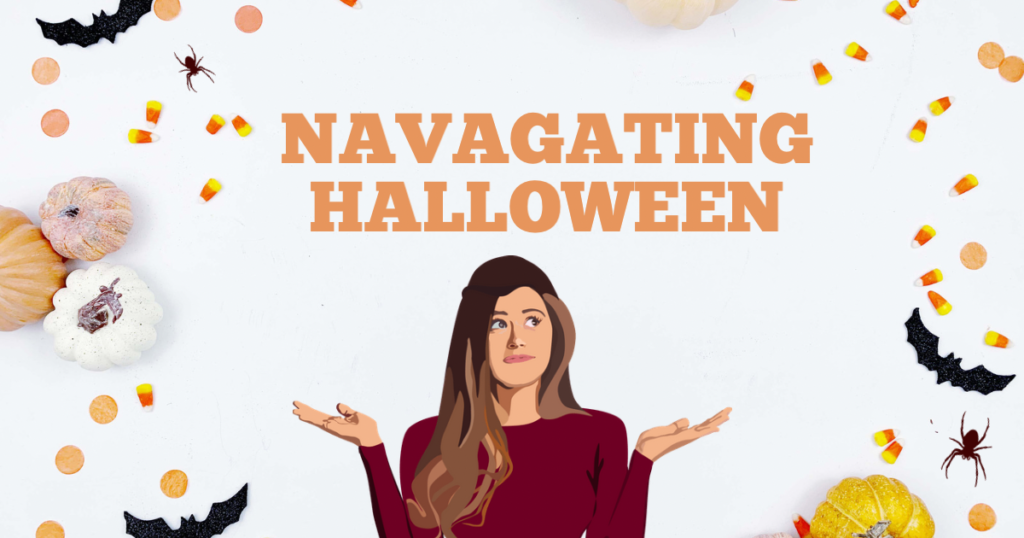
Navigating Halloween as a Christian
Finding Light in the Darkness

As October rolls around, many Christians start thinking about how (or if) they should engage with Halloween. For some, it’s a straightforward decision to stay away from the holiday due to its dark themes. For others, it’s a chance to connect with their community in a fun, lighthearted way. Personally, I do let my kids dress up and participate, but I understand and support those who choose differently. So, how can we as Christians navigate this holiday with grace and intention, no matter our stance?
Respecting Different Choices
One of the beautiful things about our faith is the freedom God gives us. In Romans 14:5 Paul reminds us, “One person considers one day to be more holy than another. Another person thinks all days are the same. Each of them should be absolutely sure in their own mind. ”- NIrV
For some, this means not participating in Halloween at all, and that’s okay. For others, it’s an opportunity to meet people where they are and share joy. What’s most important is that each decision is made with a heart that seeks to honor God.
A Favorite Month-Long Tradition
In our home, the entire month of October is dedicated to learning about the Saints who lived lives of dedication to Christ. We explore their stories, their struggles, and their acts of faith, ending the month with Martin Luther on the 31st. Torchlighters is an excellent resource for this! You can watch the shows and follow up with their FREE worksheets that go along with each episode. Check out Torchlighters here! It’s a way to keep our focus on God’s goodness, even while enjoying the fun parts of Halloween. By the time Halloween night arrives, my children have spent weeks learning that, while there is darkness in the world, they can be brave and find ways to serve God, no matter what.
The Complexity of Halloween’s History
From my understanding, Halloween’s history is quite complex, with roots that blend Christian and non-Christian influences. The origins are often traced back to the ancient Celtic festival of Samhain, which marked the end of the harvest season and the beginning of winter. It was a time when people would light bonfires and wear costumes to ward off harmful spirits. As Christianity spread, November 1 was established as All Saints’ Day—a day to honor saints and martyrs—and October 31 became All Hallows’ Eve, which eventually turned into “Halloween.”
For centuries, Halloween was celebrated with Christian customs alongside local traditions. During the Middle Ages, Christians in Europe practiced “souling,” where people went door-to-door offering prayers for the deceased in exchange for food, a custom that bears some resemblance to modern trick-or-treating. While Halloween has historical ties to certain pagan elements, it also has longstanding Christian connections.
This blend of influences can create a challenging choice for Christians today. However, history shows us that early Christians often took existing cultural practices and transformed them, finding ways to bring glory to God within those customs. This perspective offers a way forward for those of us who seek to approach Halloween thoughtfully, whether we choose to participate or abstain.
Biblical Examples of Engaging with Culture
Throughout the Bible, we see God’s people navigating the cultures around them while sharing His truth. Here are some inspiring examples:
- Joseph in Egypt: Joseph adapted to Egyptian culture, even serving as a leader within it, yet remained faithful to God. Through his influence, he blessed others and glorified God (Genesis 41).
- Daniel and His Friends in Babylon: Daniel, Shadrach, Meshach, and Abednego took on aspects of Babylonian culture, yet they courageously held fast to their faith, showing God’s power (Daniel 1-3).
- Esther in Persia: Esther embraced her role as queen, using her influence in the Persian court to protect her people and bring justice, honoring God in the process (Esther 4-7).
- Paul in Athens: Paul began his message in Athens by acknowledging their culture and used an Athenian altar to the “unknown god” as an entry point to introduce them to the one true God (Acts 17:22-34).
These examples show us how to engage with our culture in ways that honor God. Just as God’s people did in the Bible, we can use opportunities like Halloween to connect with others, bring joy, and reflect God’s love within our communities.
For Those Who Choose Not to Participate
If you prefer not to engage in traditional Halloween festivities, there are still plenty of meaningful ways to make October a special time:
- Host a “Light Night”: Consider organizing an event at your home or church with games, treats, and activities that celebrate God’s light in the world. Our church has a potluck and prays for each trick-or-treater as they come to the door.
- Service Projects: Use this time to reach out to others by doing service projects as a family. You might bake cookies for your neighbors, make cards for those in nursing homes, or put together care packages for people in need.
- Celebrating Reformation Day: October 31st is also Reformation Day, a time to remember Martin Luther’s bold actions in sparking the Protestant Reformation. It’s a great opportunity to teach children about the importance of faith and standing firm in God’s truth.
For Those Who Choose to Participate
For families like mine who do participate, Halloween can be a chance to teach important lessons and spread joy. I let my kids dress up and enjoy the fun, even if they want to dress as something a bit spooky like a skeleton (valley of dry bones), because I want them to know that there’s nothing to fear. Here are some ways to keep your focus on faith while participating:
- Be a Light: One of our favorite traditions is carving a pumpkin and placing a candle inside as a symbol of light in the darkness. It’s a visual reminder that, even though this world can be scary, we have the light of Christ with us. Consider using glow-in-the-dark bracelets or necklaces to remind others of God’s light shining through the darkness.
- Acts of Kindness: Halloween can be a wonderful time to practice giving. While my kids love collecting candy, we also donate most of it. It’s a way to give more than we receive, which reflects God’s generosity.
- Building Community: As Christians, we’re called to build community and fellowship, and sometimes the most effective way to do that is to meet people where they are. Consider taking your trick or treaters to places that may not get many visitors, such as nursing homes or care centers, to brighten someone’s day.
Bringing Jesus into the Community
Halloween can be an incredible opportunity to meet people where they are and to bring light into the community. Here are some ideas to share the love of Christ with others:
- Pray for Each Home: If you’re out trick-or-treating, what if you took a moment to pray for each family at every house you stop by? Praying for those families is a simple yet meaningful way to spread Christ’s love.
- Dress as Biblical Characters: Consider dressing up as characters from the Bible. When people ask, “Who are you dressed as?” you can respond, “I’m Daniel, and these are the lions from the den!” It’s a great opportunity to practice memorizing and sharing scripture in a fun and engaging way.
- Give Instead of Receive: Imagine taking your family around town, going door-to-door, but instead of collecting candy, you hand out small gifts, encouraging notes, or Bible verses. This kind of radical kindness reflects the way Jesus served others, turning Halloween into a day of giving rather than receiving.
Finding Freedom and Peace in Your Decision
Whether you choose to opt out of Halloween or participate in it, remember that there is no “one-size-fits-all” answer. What matters most is that we seek to glorify God in all we do. Colossians 3:17 says, “Whatever you do, in word or in deed, do everything in the name of the Lord Jesus, giving thanks to God the Father through him.”
As always, pray for wisdom and seek guidance from God. And know that, whatever you choose, you can be a light in the darkness. There’s no need to be afraid, for as 1 John 4:4 says, “Greater is He who is in you than he who is in the world.”
Have a wonderful day!
-Amy
